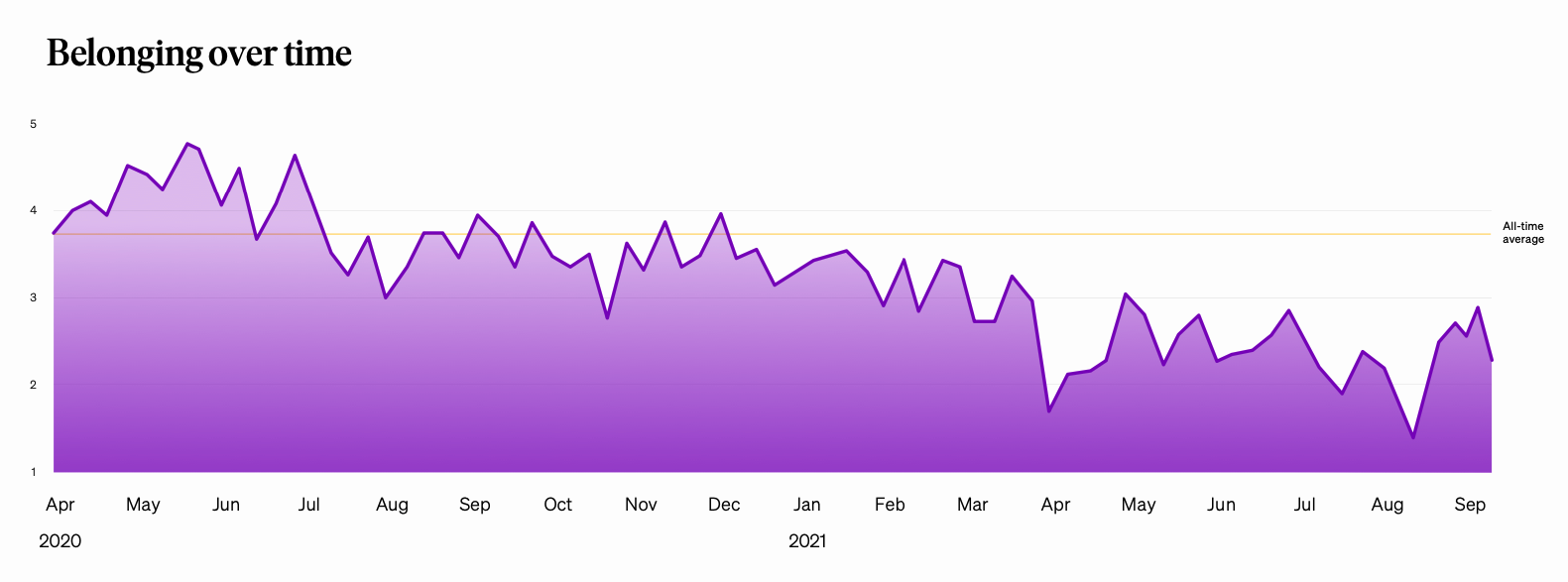Jump to section
Hybrid work levies a “belonging tax” on your people
Why the belonging tax is a steep price to pay for organizations
For Business
Products
Build leaders that accelerate team performance and engagement.
Drive productivity through sustained well-being and mental health for all employees with BetterUp Care™.
Solutions
Transform your business, starting with your sales leaders.
Foster a culture of inclusion and belonging.
Customers
See how innovative companies use BetterUp to build a thriving workforce.
Resources
Best practices, research, and tools to fuel individual and business growth.
View on-demand BetterUp events and learn about upcoming live discussions.
The latest insights and ideas for building a high-performing workplace.
Innovative research featured in peer-reviewed journals, press, and more.

Jump to section
Hybrid work levies a “belonging tax” on your people
Why the belonging tax is a steep price to pay for organizations
The pandemic unleashed a whirlwind of profound changes that impacted our professional lives in a relatively short period. How, when, and where we work had to evolve overnight, and as a result, organizations and employees scrambled to adjust. While some changes proved to be trends that faded quickly (Zoom happy hours, anyone?), remote and hybrid work weren’t. In fact, as workplaces began to bring employees back, the demand for hybrid work among employees only grew, and work arrangement preference quickly cemented itself as a new kind of diversity that organizations need to embrace.
Before 2020, hybrid work wasn’t prevalent across the workforce — just 7% of employees reported having some kind of hybrid work arrangement. But now, a third of workers say they’ll quit their jobs if forced to go back in person full time, and 52% say they want hybrid work moving forward. Overall, 3 out of 4 workers say they would take salary cuts or reduced perks to keep their hybrid work arrangement intact.
The rise in popularity of remote and hybrid work is no surprise — the increased flexibility, boost in control over work-life balance, and respite from the interruptions and distractions commonly found in the pre-pandemic office led to employee productivity, and for some well-being. Toward the middle of last summer, the overwhelming majority of organizations thought it was working too, with 83% of leaders saying the shift to remote work had been successful for their company.
Against the backdrop of “the great resignation” and rapid evolution in employee expectations for employers, many organizations like Google, Lockheed Martin, and Citigroup have adapted to fully embrace hybrid work for the foreseeable future in support of employees’ work arrangement preferences. However, hybrid work has its challenges despite a surprisingly easy shift to this entirely new working paradigm.
While employers have benefitted from productivity gains, the prevalence of hybrid work has brought on difficulties for employees despite their stated preferences. The increased isolation, lack of social connection and shared experience, and an “us vs. them” mentality threatens to create a two-class system where workers in the office may be overvalued or over-rewarded with opportunities for growth and advancement while remote workers find themselves on the outside, the slow track, or irrelevant. As a result, this divide experienced by hybrid and remote workers is fueling high levels of stress and burnout while also contributing to increased feelings of exclusion. All these factors culminate in a new phenomenon for workers we’re calling “the belonging tax.”
For individuals, the belonging tax is the price they pay for the convenience, flexibility, and work-life balance gained from remote or hybrid work. For organizations, the belonging tax is less easily shrugged off. It means a drop in the experience of inclusion and belonging felt by hybrid or remote workers now that their work arrangement is no longer shared by the broader workforce. The result of not having a physical presence in the office full-time means missing out on the connections, influence, and visibility required to experience job satisfaction and intent to stay.
Our new research shows that hybrid work arrangements are increasing more rapidly than returning to the office full-time. June 2021 saw a 223% higher rate of return to a hybrid work arrangement than return to full-time office work. In general, the trend suggests that people are not simply going back to pre-pandemic ways of working, they are entering a new form of work altogether.
These different work arrangements mean different access to information, communication channels, formal and informal relationship-building opportunities, networking, and social connection. The desire for hybrid work may also reflect that people are at different life stages with different stressors, demands, and aspirations.
While the data say hybrid and remote workers experienced boosts of resilience, optimism, and productivity, this well-being advantage may reflect a calculated balance between personal benefits and the added complexity of partial in-person work. In fact, more important for companies seeking to build strong cultures, tap into diverse talent, reduce attrition, and drive peak performance is that over the same time period, we’re seeing that employees are also experiencing their lowest levels of belonging within their organizations since the pandemic began.

What may be driving the drop in belonging, and why does it matter? Under stay-at-home orders, much of the workforce got into the same “work-from-home boat.” Now, with some people back in the office, others in hybrid work, and others staying home entirely, it’s more apparent that we’re not all in the same boat. We’re in different boats that are moving further apart. The belonging tax makes it harder for hybrid and remote workers to maintain connection to their in-office peers and managers.
The belonging tax will have an immediate, negative impact on organizational success moving forward. Our data show that belonging is paramount for everything from retention to job satisfaction — both especially important in a raging war for top talent. We recently analyzed 60 potential predictors of intent to stay (across 5,374 BetterUp Members), including a range of leadership skills, work behaviors, states (such as engagement), and personal skills (such as resilience and growth mindset).
The top five predictors of high employee intent to stay were:
Belonging was second only to organizational commitment, a state partially influenced by factors such as fear of job loss or sense of obligation. In fact, the data show that, collectively, 1) our connections to others and 2) our connection to the work itself matter the most for intent to stay.
This combined with the downward trend of belonging through 2021 offers a powerful enticement: organizations that find a way to maintain a sense of inclusion, belonging, and desirable employee experience within, or despite, hybrid or remote work will have a distinct competitive advantage.
The belonging tax isn’t inevitable. But for organizations to avoid paying it will require deliberate effort and conscious choices to enhance the sense of belonging lost through hybrid work. Perhaps no other group plays a more pivotal role in this effort than frontline managers. Just as parents have had to navigate the complexities of family systems against a backdrop of hybrid school arrangements and remote learning, managers are navigating the complexities of team systems against hybrid and remote work arrangements. Where the rubber meets the road — its managers who will have to make work “work” in this new hybrid era.
The key to that ignition? Inclusive leadership.
BetterUp recently launched our quarterly research report that uncovers what it means to lead inclusively in this new world of work. The in-depth data from 10,000+ BetterUp Members provide you a window into the unique differences, challenges, and needs of populations impacted by the pandemic, including underrepresented minorities, women, working parents, and those in hybrid work environments. In addition, you’ll learn how focused investments can better equip your frontline managers to lead all your people in an inclusive way that drives sustained impact, change, and results across your entire organization.
Sr. Content Marketing Manager
Products
Solutions
Customers